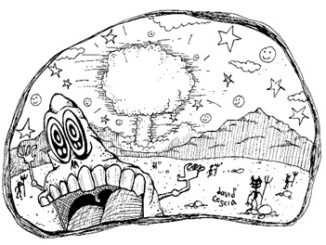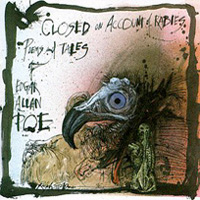 Wig Rodeo
Wig Rodeo
With Ghia Avesani, Jeff Charroux, Kehris Degelsey
Created and Directed by Marcel De Jure
(No (Know) Information Netwerk Productions)
by William Ham
There’s nothing like a nice blast of sub-independent no-budget filmmaking to clear the Hollywood-narcotized brain every once in a while, and Wig Rodeo, a goofball twenty-minute black-and-white piece of live-action animation with a Nino-Rota-via-Carl-Stalling-on-a-busted-four-track score and a dialogue track consisting solely of wordless grunts, moans, and babble, which arrived here semi-mysteriously with absolutely no word of mouth, distribution, or apparent sense, proved to be just the ticket. Ticket to where, I’m not quite sure. It’s your standard post-industrial-wasteland scenario with lotsa chintzy props, ratty wigs, anthropomorphized objects, shadows, cheesy menace, mindless violence, absurdist decadence, and hyperactive-kid-with-a-loaded-Super-8 camerawork, except different. It’s a return to the herky-jerky zoetropic origins of 20th century film, as if David Lynch had been whisked away from this era sometime between the completion of The Grandmother and the inception of Eraserhead, got plunked down in a primitive studio lot where Tod Browning, Ernest Lubitsch, and Eric von Stroheim were in the middle of a long liquid lunch, went around the table whispering something enigmatic into each of their ears before going off to circumvent history by talking Hitler into co-founding the first Bob’s Big Boy restaurant. The three directors, disturbed by this bizarre intrusion, leave the table shaken, none of them daring to tell the others what they heard, but going off and collaborating on an obscure epic, the only copy of which gets stolen by some wayward Situationists, who cut it up, resplice it, and slip it into the projection booth at some small-town movie house, where it incites a riot which spreads to every adjacent town within a 300 mile radius, after which the survivors get together, decide to start the Great Depression a few years early, take their shoes and socks off, and fall into a mass slumber which lasts for the next fifteen years and gets praised by lunatic French intellectuals as the beginning of a new renaissance. I could paraphrase the box copy and say it makes some statement about modern life in the midst of the new totalitarianism, but I prefer to think my interpretation is the correct one.
 Wig Rodeo
Wig Rodeo


